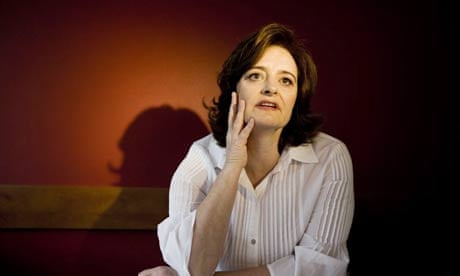Cherie Blair has police with guns at her front door and police with guns in her back yard. The glass in her windows is so thick it feels like steel. There is constant hammering and drilling as government engineers install defences deep in the fabric of the Connaught Square house into which she moved last summer. We meet in one of the best-defended sitting rooms in the western world.
Yet, remarkable to relate, the former prime minister's wife is relishing a new-found freedom. "I took the tube and the bus just the other day to see Euan," she says. "I'm getting the hang of Oyster cards." Last Sunday, after mass, she walked home much of the way. "I popped into the local Marks & Spencer the other evening to buy something. The girls on the check-out were completely gobsmacked when I just turned up with my basket."
We are all suddenly seeing a lot more of Cherie Blair, though, and some are complaining we are seeing and reading too much for comfort. With an autobiography to sell (Speaking for Myself, published this week) she has finally given way on one of the most enduring prohibitions in modern political journalism. It is 25 years since I first met Cherie. Scarcely a year of that time has passed without me suggesting an interview. Every time I asked she refused. Until now. This is quite an occasion.
The media purdah was an absolutely deliberate New Labour strategy, devised by Alastair Campbell but willingly adhered to by Cherie. Tony Blair was the story. Cherie was not. "I knew," she admits, "that if I did an interview with any British journalist at all then it would open the argument that if I've done it with one person then I should do it with others." As a result, though she is one of the most written-about women in Britain over the past 15 years, she is simultaneously one of the least known.
"I never thought at the start that I would be of great interest. How naive was that?" she says. The trouble with the strategy, she now admits, was it created a vacuum which a generation of journalists happily rushed to fill. "They commented on what they thought I thought, and what they thought I did, some of which was frankly bizarre, and on what they thought I was like. Given that most of these writers haven't ever met me or have only met me once, it's a very distorted view."
Speaking for Myself is her attempt to redress the balance. The launch hasn't got off to a trouble-free start, though the sales are sure to be huge. Serialisation in the Times and the Sun over the past week has already deluged the reading public with more information than many of them can quite take about Cherie's contraceptives, her children's conception, her breastfeeding, her miscarriage, her romance with her husband and, oh yes, her political views. Cherie-haters have had a field day.
"I haven't read all of it," she says. "Am I surprised about it? No. But I think that if people read the whole book, they will get a more balanced view." She'll be content, she says, if young Liverpudlians, as she once was, realise that "a girl from working-class Liverpool can make it in the legal profession through a good education and perhaps some good fortune."
Her story, though, is a unique cocktail of law and politics, spiced at every turn by her own character. Nothing embodies that better than the anecdote with which she starts the book. Leaving Downing Street for the last time a year ago, she called to the press as she got into the government car: "Bye, I won't miss you." Then, as her book relates: "'You can't resist it, can you?' Tony said through clenched teeth as the door closed behind me. 'For God's sake, you're supposed to be dignified, you're supposed to be gracious'."
Now, a year later, she laughs at the memory. "It does ring true, doesn't it? Remember I am the working-class girl from Liverpool and he is the nice middle-class public schoolboy. But both of us unite about two things that we care passionately about. One is God and religion, which is one of the first things we ever talked about. And the other is social justice and the Labour party. Socialism if you want to put it that way."
So, I ask, do you call yourself a socialist? "Yes I do. You know I do. I have no problem with saying I am a socialist or with saying I'm a feminist. That's how I was when I was 15 and, you know, I haven't grown out of it, and probably never will." And your husband? "I'm probably the only person in the country who insists my husband is a socialist." What does he say to that? "He does his usual thing. He smiles and rolls his eyes and knows exactly what I mean."
We turn to the great political shadow that hangs over the Blair years. She explains how, as the Iraq war neared, relationships in No 10 began to sour. Cherie's long relationship with Fiona Millar, Alastair Campbell's partner, began to break down as Millar became increasingly critical of the march to war.
Did you support the war, I ask? "Absolutely," she replies. "The one thing I knew was that Tony is a person of integrity and that he was absolutely doing everything he could to avoid a war. If he felt in the end this was the right decision for the country then I - who had not seen the papers - was absolutely convinced that it was too."
As a Queen's Counsel, though, how did she feel about the legality of the war, I ask. Now, suddenly, her conversation becomes more watchful and cautious. This is a big subject and she naturally hesitates. "I'm not going to give legal advice about that. Nor is it necessarily my particular area of expertise,"
Except, I reply, you must think about these things. You know a lot about international law. You have given lectures on the subject. "I do know about international law," she says. "I feel very strongly that we need to do more to try to improve the structure of international law and indeed to find other ways of resolving conflicts. I'm not going to express any legal views on the Iraq war. But I'm perfectly happy to express the personal view that I believe my husband did the right thing.
"Of course, as a lawyer, I thought about it" she continues. "And like everything else, as we know from the attorney general down, there are different views about this matter. The one thing I would say, as a lawyer, is that we all know that if there had been a right answer to it in international law terms, don't you think that would have been clear? It wasn't clear. It still isn't clear.
"I was not advising the army and nor was I advising my husband on the law. I really am not going to get involved in a discussion about the legal position of the Iraq war. I am not the person to do that because I am not sufficiently impartial as a lawyer about this, because it's a matter that is of interest to the person that I am closest to in the world."
She is more comfortable talking about her human rights law work. We talk about her recent lecture about the place of torture in international law. "Torture produces unreliable evidence and therefore doesn't achieve and protect anybody. Torture corrupts those who are doing the torturing."
I ask if she thinks Britain's reputation has been damaged in international human rights law circles. She says she thinks not. "I travel a lot still," she says. "Britain is still seen as a beacon for decency, for democracy, for vigorous judges upholding the rule of law and, dare I say it, a free press. I respect the press in theory, but when you see some of the things it writes about you it's not exactly a happy relationship."
Nothing has done more damage to her own repuation than the perception that she is greedy about money. "I don't know whether that's really true," she says. She concedes that worrying about financial security may be "in my psyche because of my father leaving us". She never had to go without food as a girl, she is quick to say, but adds, "We didn't have money."
"Now I sometimes pinch myself to think that the girl from Liverpool should have got to a situation where I'm comfortably off and I thank God for it. But it's not the thing that gets me up in the morning. If it was the thing that got me up in the morning I'd never have wanted my husband to go into politics."
She is exceptionally cautious about discussing domestic politics since her husband stepped down. We go through the motions, but she gives standard answers. "I don't accept that things have gone badly under Gordon Brown," she says. "We have a fantastic Labour government and a fantasic Labour team."
Blair and Brown still talk regularly, she says. She won't say how often, or what they discuss. "You'll have to ask my husband about that. But when Tony is in the country he speaks to Gordon."
She still thinks about the departure from Downing Street a lot and it is surely significant that she has chosen that moment to frame her book. "I still find it quite emotional, in a personal rather than a political way," she says.
Have you ever been invited back to No 10? There is a long pause. "No," she says. Very softly.
· Cherie Blair will be appearing at the Guardian Hay-on-Wye Festival on Saturday May 24

